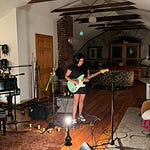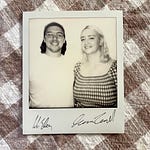The latest EP from Denver electronic producer Iron Hox starts with a bit of sound design straight out of a horror movie. Water droplets echo deep inside a crumbling cave; from the abyss appears a figure drenched in autotune; then, heaps of clipping, thunderous bass bury everything in rubble.
It’s a fake-out, a harsh noise false alarm. Though the rest of Light That Slices is defiantly murky and abrasive, its songs hint at the pop aspirations of 24-year-old Korinne Gerome. They also showcase her versatility as a producer, combining looser ambient pieces and heavy, skittering club tracks.
For the first Loops podcast of 2024, I met up with Gerome to talk about Light That Slices, her journey as a producer and why she wanted to make “queer joy” songs. Listen to the episode above; you can also view the transcript below.
Miguel Otárola: Hi, this is Miguel, and I'm here with Korinne Gerome of Iron Hox.
Korinne Gerome: Hi. It's a pleasure to be here.
Miguel: Where are we?
Korinne: We're in Cheesman Park outside of the fountains by the pavilion.
Miguel: Can you tell us the name of the EP?
Korinne: It's called Light That Slices.
Miguel: It's got this strong variety of sound. It goes through a certain scene, it rises to some of the harder tracks, and then it calms down and ends on a more somber tone. I guess all of it is pretty somber-toned.
Korinne: For sure. Yeah, I think that somberness is kind of inescapable, no matter what I try to do. It's always just a part of things. A lot of my music that I made in the last year did address a lot of very personal stuff, and it went to some pretty low lows. And so with this one, I was definitely trying to rebound from that a little bit and have more fun with it. That's definitely a big part of why I make stuff, is the maniacal laughter that I get from hearing a sound that I've never heard before that just rocks me to my core. It's like, Whoa, this is just sick. So it was definitely an effort to make more fun music. And there's always going to be that little bit of shade in there, I guess, or somberness. Ultimately, I wanted it to be this ecstatic, euphoric, and emergent listen, I guess, coming out of my last few projects.
The textures that I add, I want them to be as tactile as possible, but also the rhythm, the kicks, the snares, every piece of that mechanism. If you're listening to it on speakers, I want it to physically hit you. I want it to be this hit of sound that's just guttural and undeniable. I bump up the levels on a lot of stuff, maybe past what should be done. I clip a lot when I'm making stuff. Or on Logic, the volume levels clip a lot 'cause I'm just constantly pushing it past where it should go. I'm like, It needs more, it needs more! But I want it to have that very physical feeling.
I would say that glitch is definitely a big aspect of it, but ultimately, I want to make pop music. I want it to be so torn up and so far removed from pop conventions, but I also want it to read as catchy and poppy. I guess glitch is just an overarching term, a broader term that I've settled into, because it just kind of allows me to do whatever. And it all factors into this error, I guess — this error mentality or error philosophy — and the textures that you can get out of computer noises and found sounds and whatnot.
Miguel: When did you start getting into making music?
Korinne: Well, I learned piano and guitar when I was in middle school, when I was about 11 or so. It was just something that I really enjoyed doing, but I didn't really take it all that seriously. It was just kind of a hobby at that point. But I started making music, or started using Logic and making electronic music, when I was 17 in my senior year of high school.
Miguel: Where was that at?
Korinne: That was in Parker, Colorado. I met a friend, or I reconnected with a friend who I'd known years ago. It's a pretty small community up there, but we reconnected in senior year of high school, and he was kind enough to take time with me and just show me how to use Logic. And we spent that entire summer, just spending hours together, making trap beats and just generally messing around with sound. That was a big— I made a realization at that point that this is the one thing that I feel like I can do for hours a day and never get bored of it, and I'm just having fun this entire time.
Miguel: Is there anything in particular that you've really kind of gravitated to over time?
Korinne: Genre wise? I would say industrial music is a big one that has kind of followed me. Anything with distortion. “Crunchy electronic music” is kind of what I call it. It's just that sensation that you get from listening to really compressed drums or really big walls of distortion and effects. I've tried to apply that in so many different contexts, and it's just something that constantly hits me. As soon as I hear it, I'm just filled with energy. A lot of the times it's such a negative or it's used in such negative applications, like industrial. There's a lot of stuff about misanthropy and the human condition of suffering and stuff. But when I hear that sound, it doesn't always necessarily communicate just aggression, rage, and sadness. I feel like it can be more cathartic than that.
Miguel: What is the other kind of art and artists that have been formative then, in your life or in your sound?
Korinne: I would say that Arca is definitely up there, for sure. She was one of the first experimental musicians that I listened to, and just— the amount of versatility that she has, after doing some more research on her early on and being like, Oh my God, she's everywhere. She's had production credits on FKA twigs records, on Kelela [records], on Yeezus. She just kept popping up everywhere. I love how she still does tear up conventions of pop music, and now reggaeton with the KICK series:
Korinne: I think a big aspect, too, of what I love about her music is that it still does read as pop. There's melody in there. There's these rhythms, even though they're kind of all over the place and messy. But it's catchy, it's danceable, and at the same time, it also feels like you're a living thing. With Sophie's music, too. I feel like with "Ponyboy" and "Faceshopping", those vocal effects that she puts on there where it sounds like her voice is melding into the beat itself. It just feels like either an ecosystem of a bunch of different creatures working together to make this system that's producing the sound, or it just sounds like one behemoth of a creature that's just completely unified with everything going on around it.
Miguel: Do you start out songs on the piano or guitar?
Korinne: It varies from project to project. Sometimes I'll start with a vocal, sometimes I'll start with just a cool sound. But generally it's just like, Oh, I wonder if I can make something out of that. That's a really cool sound. So yeah, that's generally how it starts.
Miguel: I saw on the Bandcamp liner notes that you wrote that it's also maybe the last project on your MacBook?
Korinne: Yes. Yeah. Unfortunately, my computer is going on 10 years now, and I spilled an energy drink on top of it not too long ago, and so it started to rapidly — I have it plugged in and it will stay at that percentage — but it's slowly starting to eek down. It's just like the countdown to its death. I was just trying to make as many tracks on it as possible before it crashes. It's sad! Is it weird to be emotional about losing a computer and in this way? But that computer, I have made everything on, which is kind of why I'm so attached to it.
Miguel: How much total music?
Korinne: Oof. I have… I mean… Oof. Aside from the things that I've released, there's probably, not even kidding, hundreds of tracks that have come out of that computer. If not, yeah… It's too much to count at this point between just one-offs, little experiments that I did when I was first starting to make music, tracks that materialized around different projects that I didn't want to release, and then just little sketches that never really led anywhere. There's so much music that has come off of that computer. It's ridiculous.
It's allowed me to have a lot more catharsis, and I'm just grateful to it for that, even though it's an inanimate object. It's like, I'm grateful to you for giving me this ability to do this. But yeah, need to get a new computer soon, very soon.
Korinne: Another big thing that I tried to do with [Light That Slices] was make "queer joy" songs. There is a lot of music and discussion around the dysphoria and the suffering that goes along with the trans experience. It's just kind of inextricably linked to it. I was having a hard time finding artists that are expressing more joy about the queer experience and about the trans experience specifically. So with this project, I just wanted to make things that sounded like, Hey, we made it. We're going to be okay. Things are still horrible… especially with all the laws being passed in the southern states and whatnot, it's scary, and with the election coming up, it's scary. But like I said in the note, I don't want suffering and fear to define my experience. There has been a lot of good that has come out of it, and I kind of wanted to focus on that.
I was in some really low spots, last year especially. This project was kind of a relieved sigh. It was just like, Oh my God. I feel like I've come to a point where I really appreciate where I am and I appreciate who I am, and I want that to shine through. This is just a period of peace for me and a period of happiness. And especially since meeting my girlfriend, and just finding that community and More Peaches. There's just been a lot of coalescing, I guess, and just more peace and joy, I guess.
Miguel: Usually I ask people what their favorite loop is. It can be anything, whether it's a particular sound or something you've made or someone else's song or beat or something like that. So what would you say is your favorite loop? And I know it's really hard to just pick one.
Korinne: I think the first one that comes to mind is the title track off of Replica by Oneohtrix Point Never. That piano line is just like, it has a little creepiness to it, but it just feels so serene to me whenever I listen to it. And all of the artificial sounds and textures and synth melodies that are kind of floating in the background do kind of add to this weird, creepy texture. As artificial as it is, [it] feels very human and almost somber and serene, and still very much communicates these very human emotions for me. Even though it's filled with all these artificial kind of sounds.
Korinne: I guess the other one would probably be the horn sample in "Off Me!" by Slauson Malone. It just beautifully leads into this massive bass hit. It's this floating, just gorgeous soul sample that just keeps repeating, but it leads so fluidly into this hard-as-hell bass hit. It's beautiful.
A Quiet Farewell, [2016-2018] (Crater Speak)… that album was also a huge inspiration. It has a narrative that runs through it, even though there's all these chaotic things happening. But yeah, it's really gorgeous. I love it.
Miguel: Korinne, thank you so much.
Korinne: Thank you, Miguel. Thank you for having me. I appreciate it.
Iron Hox’s new EP, Light That Slices, is out now on Spotify, Bandcamp and Apple Music.
















Share this post